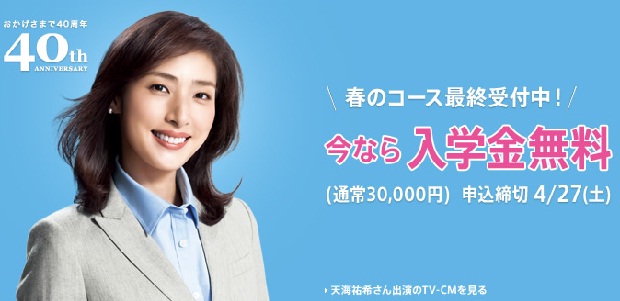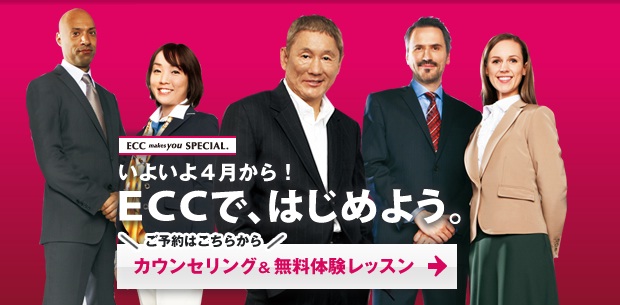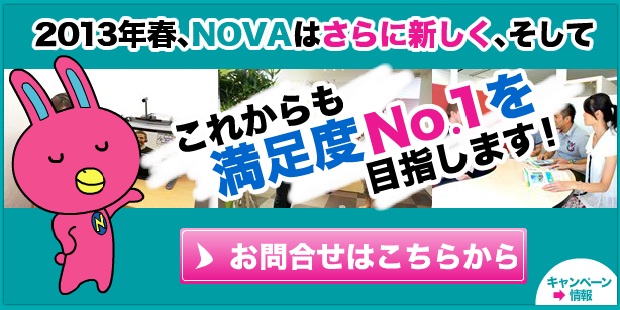In Japan, April is the month of new starts. The new school year. New company employees join their firms. And we see an increasing number of TV commercials promoting the message of “It’s now or never!” — and eikaiwa (conversational English) schools are no exception for that.

Source: AEON
As Japan adapts itself to become a more globalized nation, we can’t avoid the question of just how important English education really is. English is now taught at all elementary schools as part of their mandatory curriculum. In the business world, some companies like Rakuten and UNIQLO have officially announced the “Englishization” of their workplace.

Source: ECC
I myself learned English as a second language in middle school and high school. In addition to this “official” English education, I was also taking a thirty-minute eikaiwa lesson once a week when I was in the fifth grade. Although I don’t recall anything I learned from my personal English teacher, I do remember that she was always late to class and asked me the same question (“How was your weekend?”) every time at the beginning of each lesson.
OK, I’m not trying to criticize the way she opened conversation so much — but just that it was only a twenty-five minute lesson (because she was always late), anyway, and this “warm-up” would take up the first ten minutes! I want to point out two things here. One: as an ordinary citizen trying to live a peaceful life, one weekend cannot be that different from another. Two: knowing that she would always ask me the same question somehow made me feel like I HAD TO do something special every weekend. I was forced to come up with an answer — sometimes even make up one — to that dreadful question which I’m not sure, to this day, whether it came from her sincere, pure curiosity to find out what her student did over the weekend or was simply written in her teaching manual. I’m leaning towards the latter.
But there is no question about eikaiwa schools being the most profitable enterprise in the English-learning industry. One of the most notable schools in the history of eikaiwa business was Nova. Some of the readers might remember it from the famous school mascot, the pink Nova rabbit, or Nova Usagi. Nova’s biggest appeal was ekimae-ryugaku — which basically meant that people no longer needed to go overseas to study English, thanks to Nova’s attempt to have a school near every major train station.

Source: Nova
While Nova succeeded in making English schools more accessible to anyone, other competitors found their own marketing strategies to lure the students away from the old school. Gaba, for example, is known for its luxurious facilities, more personalized one-on-one lessons and much longer business hours, from 7 am to 10:40 pm. In 2011, Gaba was acquired by Nichii Gakkan, the company which recently launched their own eikaiwa brand called COCO Jyuku.
COCO Jyuku takes a somewhat different approach to millions of prospective customers out there. The first time I saw their commercial on TV, I was struck by the elegance of their message. There was no classroom, obedient students or happy-looking teachers in business suits.
They made English-learning seem like a higher-level, more sophisticated activity, when in reality it is a process of sweating while trying to memorize twenty words a day and remembering only a few a week later at best. (Or maybe this was just me.) Or feeling like a six-year-old again due to having limited vocabulary and grammar when we know we can say the exact same thing much more “elegantly” in our native language.
The point I’m trying to make here is this: we the consumers already know that advertisements or marketing phrases are all manipulative in one way or another. Yet COCO Jyuku doesn’t even give us a chance to see what their teachers are like. They skip all the learning process and instead show us a perfect movie scene. How realistic is it?





















2 Comments
Yes,learning language is very important..Language skills enrich one’s personality, social life, and open up job opportunities while deficit of language fluency hampers communication and subsequently, progress.
I see this article is a few years old, but I thought I would reach out anyway. I am soon going to be helping to run an English immersion school in Japan called Mikuni International. Marketing is one of the things we are focusing on now. You talk a fair amount about things you don’t like in these schools’ marketing materials. What would you like to see? I believe our program and school are amazing (no late teachers or dull classes, I hope!), but the hard part is spreading the word effectively.